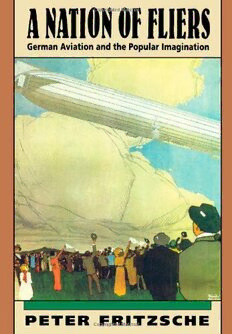
A Nation of Fliers: German Aviation and the Popular Imagination PDF
298 Pages·1992·13.439 MB·English
Most books are stored in the elastic cloud where traffic is expensive. For this reason, we have a limit on daily download.
Preview A Nation of Fliers: German Aviation and the Popular Imagination
Description:
Gigantic, fragile airships hovering in a vast sky, war aces obsessed with death and destruction, daring young men launching their handbuilt gliders, schoolchildren wearing gas masks during air-raid drills - the bright idealism of flight and its darker service in total war come to life in this book about Germany's perilous romance with aviation. From the Kaiser's Second Reich to Hitler's Third Reich, machine dreams mingled with imperial dreams and mastery over the natural world held the promise of mastery over the political world. This is popular history of the modern era. From the crowds in the shadow of Graf Zeppelin's hugely popular airships, to the myths surrounding the chivalrous fighter pilots of World War I, and finally to the global reach of airplanes in the 1920s, Fritzsche aims to show flight to be a rich symbol for vitality and modernism. But German aviation was more that an exuberant story of technical accomplishment; it became a dark tale about nationalism and conquest. Even before the Nazis, fliers embodied a new breed of men and women who stood ready to restore German power. The book concludes with an exploration of the troubled intersection of modern technology and National Socialism. By drawing from numerous private archives, including those of Lufthansa, the Zeppelin Company, the German Aero Club, and the papers of "the father of gliding", Oskar Ursinus, as well as by analyzing popular poems, songs, and patriotic appeals, Fritzshe parades through his story such heroes of aviation as Graf Zeppelin, Manfred von Richthofen, Oswald Boelcke, and Marga von Etzdorf. In doing so he traces the fascination with aviation of Weimar writers from Bertolt Brecht to Ernst Junger, dramatizes the grand twentieth-century spectacle of masses and machines, and seeks to provide a striking picture of the German imagination in a dangerous age of technological achievement and nationalist passion.
See more
The list of books you might like
Most books are stored in the elastic cloud where traffic is expensive. For this reason, we have a limit on daily download.
